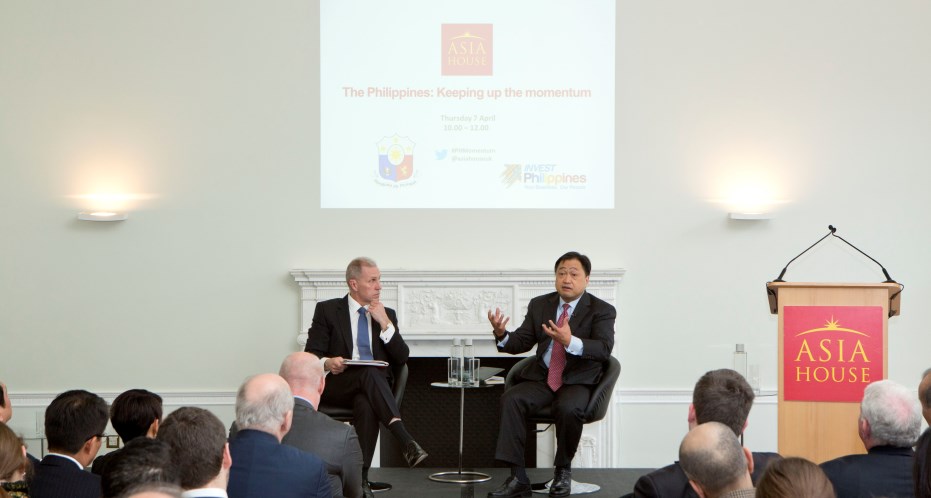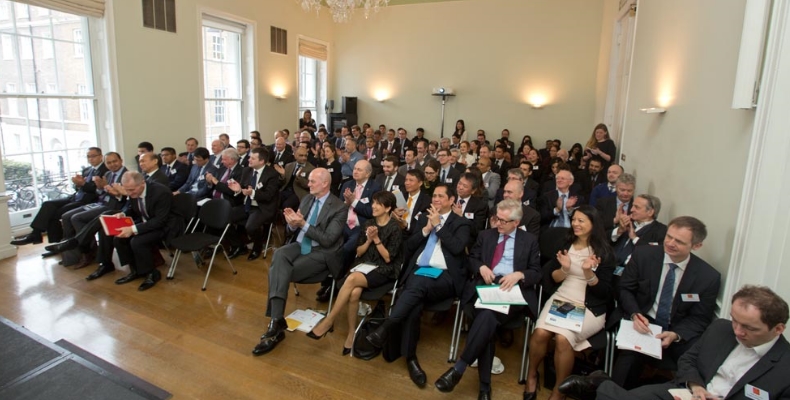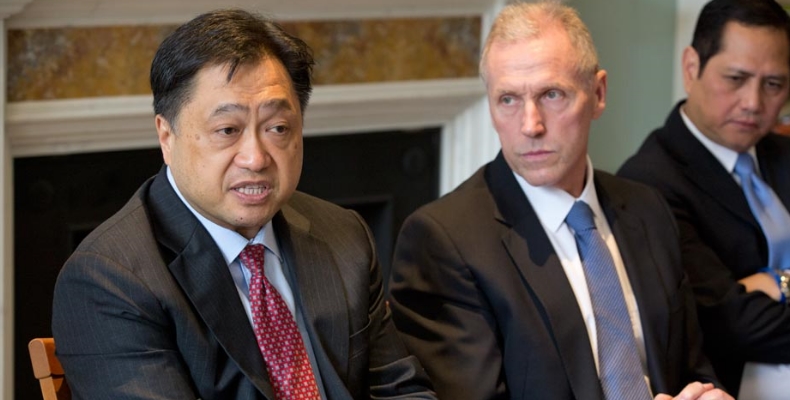Driving commercial and political engagement between Asia, the Middle East and Europe
Driving commercial and political engagement between Asia, the Middle East and Europe
Driving commercial and political engagement between Asia, the Middle East and Europe

Philippine Finance Secretary Cesar V. Purisima spoke of his confidence that economic reforms in the country would continue regardless of which candidate wins the country’s 16th presidential election on 9 May 2016, in a speech at Asia House.
The Philippine Constitution bars a president from serving for more than one six-year term. The incumbent President Benigno Aquino III has been widely credited with weeding out corruption in the country, tackling poverty and encouraging foreign investment by bringing out a string of economic reforms, with Mr Purisima himself as the driving force.
Under the administration of President Aquino, which started in 2010 and will end on June 30, Philippine economic growth averaged at 6.2 percent, the best rate the country has seen since the 1970s.
Addressing a group of senior business leaders, CEOs, finance professionals and diplomats at the conference ‘The Philippines: keeping up the momentum’ held at Asia House on Thursday, Mr Purisima said: “It’s important we choose someone with a strong mandate and someone who will continue the reforms implemented by President Aquino. With my knowledge of the candidates, I believe that all four of them will continue the reform programme. It will just be a different style, emphasis and branding depending on who is chosen.”
But he insisted the “substance” would remain the same and he predicted the fiscal and macroeconomic stability to continue, as would investment in infrastructure and people, a focus on agriculture as a key sector, as well as the opening up of the country and of simplifying of bureaucratic procedures. “It’s just about branding, emphasis and how each of them will execute it,” Mr Purisima said.
He said there were only two things the electorate should focus on: the credibility of the process and the mandate of whoever wins. “If they have a good mandate, they will be a very good choice,” he said. “And then we will have six years either similar to or better than the current administration.”
However, he revealed that he would not continue in his position once the next president takes up the helm. This is likely to be a disappointment to many as Secretary Purisima was recognised as Finance Minister of the Year six times in five consecutive years by business and finance publications – the most recent one by FinanceAsia.
”My mandate is to fulfil the mandate of my wife, which is to get a real job,” he told the packed room of business figures.

The conference ‘The Philippines: Keeping up the momentum’ was completely packed. Credit: George Torode
He went on to outline several areas that he felt should be the focus of the next government. The first was governance, the key reason why the Philippines has emerged as the fastest growing economy in Southeast Asia under Aquino’s leadership – shaking off its former image as the “sick man of Asia” which had been due to massive poverty and corruption.
Mr Purisima said the new president should focus on the country’s key growth drivers of infrastructure, agriculture, SMEs, tourism and diversification of manufacturing.
The next government must also pass a law to institutionalise peace in Mindanao (a region ravaged by an armed separatist movement for the past 40 years), he said. That was critical for ASEAN integration, he said.
The new president should also take advantage of the Philippines demographic opportunity, he stated. The Philippines has the second largest population of all ASEAN countries after Indonesia and the average age is 23.
A continuing challenge would be to manage the ongoing geopolitical issues, he said, referring to the contested South China Sea.
He said half of the world’s trade passed through the South China Sea. “What we need to do is to continue to disagree on this but not to make it the front and head of our relationship,” he explained. The Philippines is currently challenging China’s assertions of sovereignty over parts of the South China Sea in an international arbitration court.
The new president would also have to deal with climate change-related issues. He said the Philippines suffered many natural calamities causing two per cent loss in its GDP. The solution was to build better infrastructure, more dams, better barriers to droughts and flooding and to offer insurance “to make sure that people have the mechanisms to deal with risks,” Mr Purisima said.
He then ran through the key things that need to happen in the next administration.
“We need to continue to deepen and institutionalise the reform agenda. We need to pass the Freedom of Information bill (designed to give the public access to key public documents to ensure accountability and transparency in government) which we failed to do. [The bill has not yet been passed by the House of Representatives.] But I am confident that in the next administration this will be a key focus,” he said.
He said the next administration also needed to make sure “growth was more inclusive.”
He pointed out that growth in developing economies often benefited the top tier of society first.
“As we empower SMEs and take advantage of the digital opportunity this will allow us to have more opportunities,” he said. But he said the current administration had invested heavily in affordable healthcare and education.
Infrastructure and policy connectivity also needed focus, he said, warning that TPP (the Trans-Pacific Partnership) posed a problem as the Philippines was not currently a member. “Of the 12 countries that are currently members of the TPP four are from ASEAN (Brunei, Malaysia, Singapore and Vietnam), and the other six ASEAN nations are not members,” he stated.
He said ASEAN must make sure that TPP was not a major obstacle to ASEAN integration. “Just imagine Philippines garments competing with Vietnam ones (which is a member of the TPP) as Vietnam would not have to pay tariffs to the US so policy connectivity is important as well.”
He said the infrastructure needs of the country could not be met by the Asian Development Bank, World Bank or Asian Infrastructure Investment Bank alone. “We have to be able to channel private resources to infrastructure as well,” he said. “The ASEAN Infrastructure Fund is a good first step but it is very small.”
He said although the Philippines had been accepted into the preferential tariff scheme, the EU’s Generalised System of Preferences Plus (GSP+), the Philippines needed to have a FTA with the EU. The first round of negotiations for an EU-Philippines free trade agreement (FTA) is set to take place this year.
He pointed out that his dream was to make the Philippines the “Mexico of Japan” as it was Japan’s closest neighbour. “Japan has an ageing population and it needs to carry out its own reforms, but if it does work with the Philippines more it could be a win-win in many sectors,” he said. Healthcare and medical tourism would be one obvious sector.
He said the next government also needed to expand the tax base, lower the tax rate and make it easier to pay taxes. In addition the next administration should lift the restrictions on foreign direct investment that had been enshrined in the Philippines Constitution that dated back to the “fears of the 1950s” so that such restrictions could in future be lifted by an act of Congress.
“Giving access to foreign investors gives you better access to technology,” he pointed out.
He was optimistic about the future of the Philippine economy forecasting growth of up to 8 per cent. “The Philippines has done well in the past 5.5 years because of better governance,” he said. “That just shows you the potential of our growth. Once we can improve infrastructure, growth can be higher than 6.2 per cent and can reach 7 to 8 per cent which we believe is attainable long term,” he said.
“By 2050 the Philippines could be one of the largest economies in the world and one of the biggest drivers of growth in the world as forecast by HSBC,” he said. In 2012 HSBC projected the country would grow by an average of 7 per cent over the next 40 years to become the 16th largest economy by 2050.
“We are now part of a more integrated ASEAN – the potential of which has not yet been attained,” he explained. “The vision is for ASEAN to be the hub of Asian trade as Asia is divided by the South and East China Seas and ASEAN is the natural hub to trade through,” he said. But he said that ASEAN needed to improve intra-ASEAN connectivity as well as transport links with China.
“ASEAN could become the third largest economy in the world. By 2050 more than 50 per cent of the world’s middle class will come from Asia and a large part of that from ASEAN. The Philippines is the gateway to ASEAN for Japan, the US and Latin America,” he added. “We should look at ASEAN as the entry point to Asia and businesses should look at the Philippines as we are English-speaking and fun to do business with!” he added.
“ASEAN is our third largest trading partner but it should be No. 1 or No. 2. The growth story in the Philippines to date has been mainly due to investments and the BPO sector but has not factored in the impact of ASEAN integration,” he said.
Earlier in the day Mr Purisima took part in a private briefing and roundtable discussion with Asia House corporate members. The country’s economic performance, the reform agenda, the presidential elections, infrastructure investment, governance and family conglomerates were among the topics discussed. Corporate members represented at the table included Standard Chartered, Prudential, HSBC, Jardines, Nikkei, GSK, KPMG and Bupa.

Philippine Finance Secretary Cesar V. Purisima, left, with Chief Executive of Asia House Michael Lawrence, right, at the private briefing for Asia House corporate members earlier in the day. Credit: George Torode
Watch a slideshow of images from the conference and briefing below:-
naomi.canton@asiahouse.co.uk
To read an article the Philippine Finance Secretary Cesar V. Purisima wrote about how the country is tackling climate change click here.
On 26 April 26 Shang-Jin Wei, Asian Development Bank’s Chief Economist Shang-Jin Wei will present the Asian Development Outlook (ADO) 2016 at Asia House. ADO provides a comprehensive analysis of macroeconomic issues in developing Asia, including growth projections by country and region. For more information click here.
To find out how your company could benefit from corporate membership at Asia House email Charlie. Humphreys@asiahouse.co.uk.
